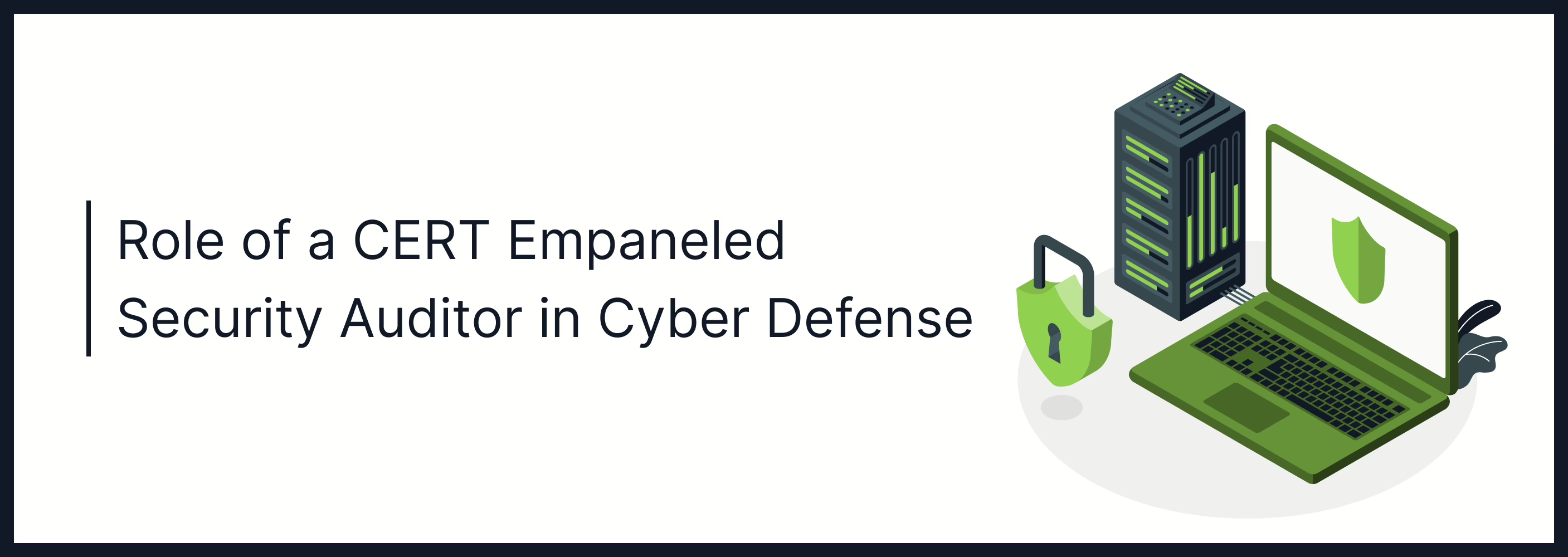
Nov 8, 2024 Information hub
Role of a CERT Empaneled Security Auditor in Cyber Defense
In today’s digital age, cybersecurity has become a critical concern for organizations across the globe. With the increasing number of cyber threats, data breaches, and sophisticated hacking techniques, businesses are under constant pressure to safeguard their digital assets. One of the most effective ways to ensure robust cybersecurity is through regular audits conducted by certified professionals. In India, the CERT Empaneled Security Auditor plays a pivotal role in helping organizations maintain their cybersecurity posture.
The Indian Computer Emergency Response Team (CERT-In) is the national nodal agency responsible for responding to cybersecurity incidents. To ensure that organizations comply with the best security practices, CERT-In empanels security auditors who are authorized to conduct security audits. These auditors are highly skilled professionals who assess the security infrastructure of organizations and provide recommendations to mitigate risks.
In this blog post, we will delve deep into the role of a CERT Empaneled Security Auditor, their significance in today’s cybersecurity landscape, the process of becoming one, and the benefits they offer to organizations. We will also explore current trends, challenges, and future developments in the field of cybersecurity auditing.
The Role of CERT Empaneled Security Auditors
What is a CERT Empaneled Security Auditor?
A CERT Empaneled Security Auditor is a cybersecurity professional who has been authorized by CERT-In to conduct security audits for organizations. These auditors are responsible for evaluating the security posture of an organization, identifying vulnerabilities, and providing actionable recommendations to improve security. They play a crucial role in ensuring that organizations comply with regulatory requirements and follow best practices in cybersecurity.
Why is CERT Empanelment Important?
CERT-In empanelment is a mark of credibility and trust. Organizations that undergo security audits by CERT Empaneled Security Auditors can be assured that the audit is conducted by professionals who meet the highest standards of expertise and integrity. This is particularly important for organizations that handle sensitive data, such as financial institutions, government agencies, and healthcare providers.
Responsibilities of a CERT Empaneled Security Auditor
The responsibilities of a CERT Empaneled Security Auditor include:
- Conducting Security Audits: Auditors assess the security infrastructure of an organization, including networks, systems, applications, and data.
- Identifying Vulnerabilities: They identify potential vulnerabilities that could be exploited by cybercriminals.
- Providing Recommendations: Based on their findings, auditors provide recommendations to mitigate risks and improve security.
- Ensuring Compliance: Auditors ensure that organizations comply with regulatory requirements, such as the Information Technology Act, 2000, and other relevant laws.
- Reporting: They prepare detailed reports that outline the findings of the audit and the steps that need to be taken to address any issues.
The Relevance of CERT Empaneled Security Auditors Today
The Growing Threat of Cyber Attacks
The relevance of CERT Empaneled Security Auditors has never been more significant than it is today. With the rapid digitization of businesses and the increasing reliance on technology, cyber threats have become more sophisticated and frequent. According to a report by Cybersecurity Ventures, global cybercrime costs are expected to reach $10.5 trillion annually by 2025, up from $3 trillion in 2015. This staggering statistic highlights the urgent need for organizations to prioritize cybersecurity.
Regulatory Compliance
In addition to the growing threat of cyber attacks, organizations are also under increasing pressure to comply with regulatory requirements. In India, the Information Technology Act, 2000, and its subsequent amendments mandate that organizations implement adequate security measures to protect sensitive data. Failure to comply with these regulations can result in hefty fines and legal consequences. CERT Empaneled Security Auditors help organizations ensure compliance with these regulations by conducting thorough security audits.
The Rise of Remote Work
The COVID-19 pandemic has accelerated the adoption of remote work, which has introduced new cybersecurity challenges. With employees accessing corporate networks from remote locations, the attack surface has expanded, making it easier for cybercriminals to exploit vulnerabilities. CERT Empaneled Security Auditors play a crucial role in helping organizations secure their remote work environments by identifying vulnerabilities and providing recommendations to mitigate risks.
The Process of Becoming a CERT Empaneled Security Auditor
Eligibility Criteria
To become a CERT Empaneled Security Auditor, individuals or organizations must meet certain eligibility criteria set by CERT-In. These criteria include:
- Relevant Experience: Applicants must have a minimum of five years of experience in the field of information security.
- Certifications: Applicants must hold relevant certifications, such as Certified Information Systems Security Professional (CISSP), Certified Ethical Hacker (CEH), or Certified Information Security Manager (CISM).
- Technical Expertise: Applicants must demonstrate technical expertise in areas such as network security, application security, and data protection.
Application Process
The application process for becoming a CERT Empaneled Security Auditor involves the following steps:
- Submission of Application: Applicants must submit an application to CERT-In, along with supporting documents that demonstrate their qualifications and experience.
- Evaluation: CERT-In evaluates the application based on the applicant’s experience, certifications, and technical expertise.
- Empanelment: If the application is approved, the applicant is empaneled as a CERT-In Security Auditor and is authorized to conduct security audits for organizations.
Maintaining Empanelment
Once empaneled, auditors must maintain their empanelment by adhering to CERT-In’s guidelines and participating in regular training and certification programs. This ensures that auditors stay up-to-date with the latest developments in cybersecurity and continue to meet the high standards set by CERT-In.
Practical Examples and Case Studies
Case Study 1: Securing a Financial Institution
A leading financial institution in India was facing increasing cyber threats, including phishing attacks and ransomware. The institution engaged a CERT Empaneled Security Auditor to conduct a comprehensive security audit. The auditor identified several vulnerabilities in the institution’s network and application infrastructure, including outdated software and weak access controls.
Based on the auditor’s recommendations, the institution implemented several security measures, including:
- Upgrading Software: The institution upgraded its software to the latest versions to address known vulnerabilities.
- Implementing Multi-Factor Authentication (MFA): MFA was implemented to strengthen access controls and prevent unauthorized access.
- Conducting Employee Training: Employees were trained on how to recognize phishing attempts and other social engineering attacks.
As a result of these measures, the institution significantly reduced its risk of cyber attacks and improved its overall security posture.
Case Study 2: Ensuring Compliance for a Healthcare Provider
A healthcare provider handling sensitive patient data was required to comply with the Health Insurance Portability and Accountability Act (HIPAA) and the Information Technology Act, 2000. The provider engaged a CERT Empaneled Security Auditor to conduct a security audit and ensure compliance with these regulations.
The auditor identified several areas where the provider was not in compliance, including:
- Inadequate Data Encryption: Patient data was not being encrypted, which posed a significant risk of data breaches.
- Lack of Incident Response Plan: The provider did not have a formal incident response plan in place to address potential security incidents.
The auditor provided recommendations to address these issues, including:
- Implementing Data Encryption: The provider implemented encryption protocols to protect patient data.
- Developing an Incident Response Plan: The provider developed and implemented an incident response plan to ensure a timely and effective response to security incidents.
By following the auditor’s recommendations, the healthcare provider was able to achieve compliance with HIPAA and the Information Technology Act, 2000, and protect sensitive patient data.
Current Trends, Challenges, and Future Developments
Current Trends in Cybersecurity Auditing
- Increased Focus on Cloud Security: As more organizations move their operations to the cloud, there is a growing need for security audits that focus on cloud infrastructure. CERT Empaneled Security Auditors are increasingly being called upon to assess the security of cloud environments and provide recommendations to mitigate risks.
- Artificial Intelligence (AI) in Cybersecurity: AI is being used to enhance cybersecurity by detecting and responding to threats in real-time. CERT Empaneled Security Auditors are leveraging AI tools to conduct more efficient and accurate security audits.
- Zero Trust Architecture: The concept of Zero Trust is gaining traction in the cybersecurity world. This approach assumes that no user or device, whether inside or outside the network, can be trusted by default. Auditors are increasingly focusing on assessing organizations’ adherence to Zero Trust principles.
Challenges Faced by CERT Empaneled Security Auditors
- Evolving Threat Landscape: The cybersecurity threat landscape is constantly evolving, with new threats emerging regularly. Auditors must stay up-to-date with the latest threats and vulnerabilities to provide effective recommendations.
- Complexity of IT Environments: Modern IT environments are becoming increasingly complex, with organizations using a mix of on-premises, cloud, and hybrid infrastructures. Auditors must have the technical expertise to assess these complex environments.
- Compliance with Multiple Regulations: Organizations often need to comply with multiple regulations, such as the Information Technology Act, 2000, GDPR, and HIPAA. Auditors must be well-versed in these regulations to ensure that organizations meet all compliance requirements.
Future Developments in Cybersecurity Auditing
- Automation of Security Audits: As technology advances, we can expect to see more automation in the field of cybersecurity auditing. Automated tools will help auditors conduct more efficient and thorough audits, reducing the time and effort required.
- Integration of Blockchain Technology: Blockchain technology has the potential to enhance the security of digital transactions and data storage. In the future, CERT Empaneled Security Auditors may be called upon to assess the security of blockchain-based systems.
- Increased Collaboration with Government Agencies: As cyber threats become more sophisticated, there will be a greater need for collaboration between CERT Empaneled Security Auditors and government agencies to address national security concerns.
Benefits of Engaging a CERT Empaneled Security Auditor
Engaging a CERT Empaneled Security Auditor offers several benefits to organizations:
- Expertise: CERT Empaneled Security Auditors are highly skilled professionals with extensive experience in cybersecurity. They have the technical expertise to identify vulnerabilities and provide actionable recommendations.
- Compliance: Auditors help organizations comply with regulatory requirements, reducing the risk of legal consequences and fines.
- Improved Security Posture: By identifying and addressing vulnerabilities, auditors help organizations improve their overall security posture and reduce the risk of cyber attacks.
- Credibility: Engaging a CERT Empaneled Security Auditor enhances an organization’s credibility, as it demonstrates a commitment to cybersecurity best practices.
Conclusion
In an era where cyber threats are becoming more sophisticated and frequent, the role of a CERT Empaneled Security Auditor is more important than ever. These professionals play a crucial role in helping organizations safeguard their digital assets, comply with regulatory requirements, and improve their overall security posture.
By conducting thorough security audits, identifying vulnerabilities, and providing actionable recommendations, CERT Empaneled Security Auditors help organizations stay one step ahead of cybercriminals. As the cybersecurity landscape continues to evolve, the demand for skilled auditors will only increase, making this a critical profession in the fight against cyber threats.
For organizations looking to enhance their cybersecurity, engaging a CERT Empaneled Security Auditor is a smart investment that can provide long-term benefits. Whether it’s ensuring compliance, securing remote work environments, or protecting sensitive data, these auditors are essential partners in the ongoing battle against cybercrime.
Actionable Takeaways:
- Ensure that your organization undergoes regular security audits by a CERT Empaneled Security Auditor to identify and address vulnerabilities.
- Stay up-to-date with the latest cybersecurity trends and technologies, such as AI and Zero Trust Architecture.
- Prioritize compliance with regulatory requirements to avoid legal consequences and protect sensitive data.
- Consider the benefits of automation and blockchain technology in enhancing your organization’s security posture.
By taking these steps, organizations can significantly reduce their risk of cyber attacks and ensure that they are well-prepared to face the challenges of the digital age.
